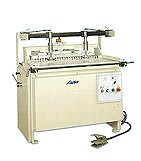|
 Woodworking
enthusiasts are finding that modern equipment is increasingly
becoming three-phase because of the better reliability and
performance of three-phase motors over single-phase. Woodworking
enthusiasts are finding that modern equipment is increasingly
becoming three-phase because of the better reliability and
performance of three-phase motors over single-phase.
Computer numeric controlled (CNC)
woodworking equipment is not that common and is usually a CNC router
used by commercial and industrial shops. Woodworking hobbyists
typically operate 10 HP or smaller manual machines in their shops.
If these motors are lightly loaded and intermittently used, even a
low cost static converter may operate the equipment safely.
However if a static converter is used, the motors will not develop
full horsepower,
|
and if loaded
to anything more than about half their rated capacity, the motors
will likely be damaged.
A
rotary converter is a more
versatile solution for the common woodworking shop because it can
operate multiple motor loads.
The voltage balance of a rotary
converter is likely to be better than that of a static converter,
but can still present a problem if the motors are fully loaded. A
rotary converter can produce balanced voltages at only one load
point, and the typical end-user cannot predict or control the
voltage balance. Voltage imbalance between the phases of just 5%
requires that a motor be de-rated by 25%. Rotary converters are not
very efficient, usually about 80%. The inefficiency may not be
of much concern for a hobbyist as
|
the loads are
usually small and use is intermittent, but for commercial operations or in areas where
electricity costs are high, the inefficiency of rotary converters
can cost significant amounts.
Phase converting VFDs work well in
most woodworking shops if the equipment consists of small single
motor loads with no CNC controls. Installation of the VFD can be
inconvenient because one is required for each motor in the shop and
the controls of the machine must be bypassed, wiring the output of
the VFD directly to the motor leads.
Digital phase
converters are a versatile solution for woodworking shops, producing
high quality three-phase power that can be used like utility
three-phase to power all the three-phase equipment in the shop.
|
|